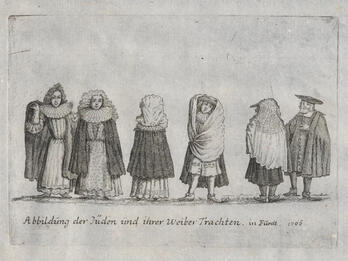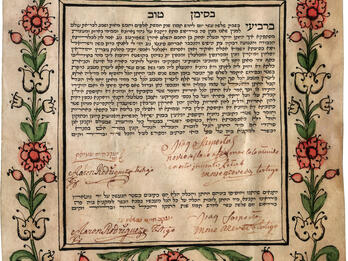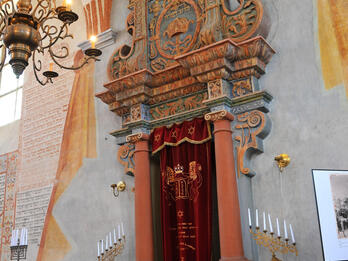Register of Proceedings: Articles of Governance
No. 74
In the name of God.
The parnasim [community leaders] and the gabbai general [warden] of this holy congregation together with the elders all present, as well as the ḥakhamim Joseph Falcon, rabbi of the congregation, and Jacob Ḥayim Attias, have agreed to record for the future, in the latest account book of our congregation, the following articles which, for our governance and in imitation of all the congregations of Israel, we write down and sign so that in the future they may be firm and stable so that no one may seek to change them, all for love and fear of God, may He guard us and sustain and prosper us in His sacred service. Amen.
- To sustain us in our governance and in imitation of all the congregations of Israel we wish the parnasim and the current or future gabbai general to meet once every fortnight in the home of the gabbai to examine what is happening in “the Nation,” and so that the gabbai should not make any decisions without the consent and resolution of his assistants.
- Since for our preservation we do not need our affairs to be made public among the gentiles to inform them about anything, we agree that if any individual wishes to use force majeure or power against the Sedaka1 he will be excluded from the general community and treated according to the rigor of the law.
- If anyone takes a maidservant or wet-nurse into his home in lieu of rent for a home or by subjugating the woman, he shall suffer the same punishment.
- We agree that all kiddushin [marriages] that take place without the consent of the parents on both sides as well as that of the parnasim and gabbai general and the ḥakham of the community, paying the fees and whatever they might owe to the Sedaka, we declare that the above-mentioned kiddushin shall be null and void, and moreover that the witnesses who were present in such cases shall incur the same punishment of excommunication, from which may God shield all the children of Israel.
- We agree that from this day forward, no yesiba [yeshiva] or committee may be set up without our consent and the consent of the ḥakham of the community, although they will not be rejected if they are undertaken in fear of God, but on the contrary, as all Jewish communities do, ours will approve and provide strong leadership in any occasion or case that might arise, preserving good order and unity, which is why we approved the yesiba and fund for the wandering poor, on condition that the current or future gabbai of the yesiba will be obliged to give the gabbai general an accounting of the people who arrive and their names and circumstances, so they can be given their dispatch and sent away with the blessing of God within three days of their arrival.2
- We agree that the yesiba and fund for the infirm poor can remain on condition that its current or future gabbai be obliged to give a weekly report to the gabbai general about the sick who are there and their circumstances, so that the Sedaka may help as appropriate.
- We agree also that those who fail to pay to the Sedaka what they owe cannot be buried, nor can their family members, unless they pay the whole amount together with whatever fine the gentlemen in charge may impose on them for not having wished to pay in the due time.
- We agree that any offerings that are made will be for the Sedaka.
- We agree that even if some families leave the Sedaka’s roll as described in the article on sheet 4, no one may be admitted who is Avignonese, German, or Italian, nor Levantine, and if it be to fill the number of eighty specified in the aforementioned article they can only be Portuguese or Spanish, to be decided in committee.
- Since an old charter states that those who wed with a dowry of one thousand to six thousand livres will pay one thirteen-livre coin, or if the dowry is seven thousand to fifty thousand, they will pay only two such coins, and because we find this to be unjust, in order to make the law fair, we agree that for each thousand received as dowry the Sedaka will be paid one écu [a French coin, either gold or silver], and no marriage can be authorized without this payment.
- We agree that no one may take up a collection for anyone without the consent of the gabbai general, not placing in doubt the giving of it, but so that the poor person might reap greater benefit, in witness whereof and with a common accord, we affix our signatures.
Jacob Lopes de Paz, parnas; Benjamin Gradis, gabbai; David Gradis Jr.; Samuel Navaro, Jacob Gradis, Henry Lopes, Leon Peyxotto, and [in Hebrew:] the ḥakham Falcon, the ḥakham Atias
Notes
[The community’s central governing body was called “the Sedaka” (also Sedaca, from the Hebrew tsedakah, charity). Jewish congregations had been illegal in France when the Sedaka was founded, so its name reflected the organization’s original supposed purpose: philanthropy. They also often called their community the Bordeaux Portuguese Jewish “Nation.”—Trans.]
[In this era, Bordeaux’s Portuguese Jewish leadership had a firm policy of forcing the wandering Jewish poor to leave Bordeaux within three days of arriving, so the city would not seem to be filling with indigent Jews.—Trans.]
Credits
The Portuguese Jewish Community of Bordeaux, “Register of Proceedings: Articles of Governance” (manuscript, Bordeaux, 1736). Published in: Le registre des deliberations de la nation Juive Portugaise de Bordeaux, 1711–1787, ed. Simon Schwarzfuchs (Paris: Fundação Calouste Gulbenkian, Centro Cultural Potugûes, 1981), pp. 138–142 (no. 74).
Published in: The Posen Library of Jewish Culture and Civilization, vol. 5.





